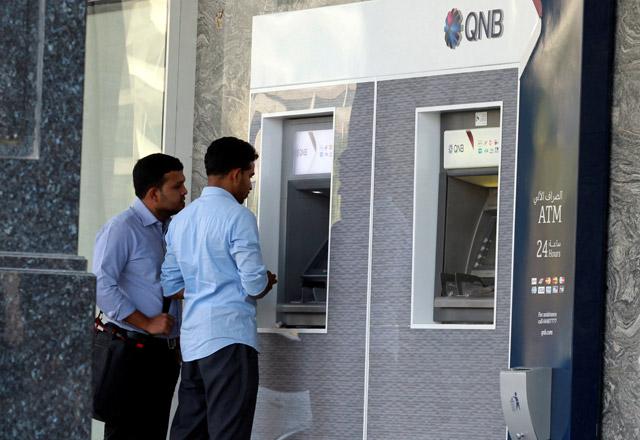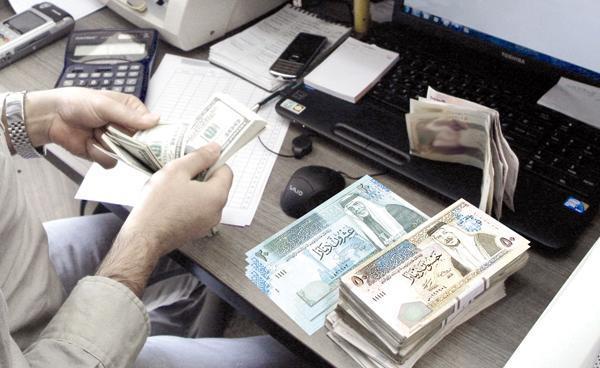You are here
Dollar shortages hit Qatar exchange houses as foreign banks scale back ties
By Reuters - Jun 11,2017 - Last updated at Jun 11,2017

Men withdraw cash from an ATM outside Qatar National Bank (QNB) in Doha, Qatar, on Sunday (Reuters photo)
DOHA/DUBAI/ABU DHABI — Shortages of US dollars hit money exchange houses in Qatar on Sunday, making it harder for worried foreign workers to send money home, as foreign banks scaled back business with Qatari institutions because of the region’s diplomatic crisis.
“We have no dollars because there is no shipment or transportation from the United Arab Emirates. There is no stock,” said a dealer at the Qatar-UAE Exchange House in Doha’s City Centre mall. “The shipment is blocked from the UAE.”
Several other exchange houses in Doha also told Reuters they had no supplies of dollars. At Qatar-UAE Exchange, dozens of people — some of the foreigners who comprise nearly 90 per cent of the population of 2.6 million — waited quietly in line to change money or make remittances to their home countries.
“I spoke with my wife this morning. She said, ‘Send your savings to me now.’ I am not panicked but my family is scared,” said John Vincent, an air-conditioning repairman from the Philippines.
“I sent 2,000 riyals ($550) home but I have some more savings left here in Qatar. I will see what the situation is in coming days before I decide what to do.”
The dollar shortages do not mean Qatar, which is one of the richest states in the world per capita and has huge foreign reserves, is running out of money. But they show how the diplomatic crisis is disrupting parts of the financial system.
Saudi Arabia, the UAE, Bahraini and Egyptian banks began scaling back business with Qatar last week after their governments cut diplomatic and transport ties, accusing Doha of supporting terrorism.
Then at the weekend, the UAE told its banks to exercise “enhanced due diligence” towards six Qatari banks which, it alleged, might have done business with people or entities on a terrorism blacklist.
That stopped short of a complete ban on business with Qatar but the effect may turn out to be much the same. UAE banks were absent from Qatar’s foreign exchange and money markets on Sunday, causing both those markets to slow down, because they feared any deals could expose them to legal risk, bankers said.
Some Western banks with a presence in Qatar continued business as normal, partly because they did not want to lose out on billions of dollars of building projects which Qatar plans before it hosts the soccer World Cup in 2022.
But other Western banks have halted new Qatar business including interbank and syndicated lending, while continuing to service existing business, banking sources said, declining to be named because of political sensitivities.
“Everybody is shocked — they’re not worried about Qatar’s credit, they’re worried about compliance and the risk that the local sanctions could be escalated to an international level,” said one foreign banker in the region.
Dollars
Exchange house dealers in Qatar said the dollar shortage was partly a seasonal phenomenon, because the Gulf’s hot summer and the holy month of Ramadan had begun, periods when there was traditionally high demand for travel abroad.
Sudhir Kumar Shetty, president of UAE Exchange, which has eight branches in Qatar, said his firm was continuing to handle remittances and currency buying as usual in that country. He said the firm hadn’t seen any major change in remittance volumes due to the diplomatic tension.
But he added that dollar supply was not meeting demand in Qatar and attributed this partly to flows of the US currency from other Gulf countries being disrupted.
“Everywhere, all the banks and exchange houses, there are no dollars. All the exchange houses are trying to get currencies from other countries,” the dealer at Qatar-UAE Exchange said, adding that his firm was hoping for a shipment from Hong Kong.
The six Qatari banks named by the UAE — Qatar National Bank (QNB), Qatar Islamic Bank, Qatar International Islamic Bank, Masraf Al Rayan, Doha Bank and unlisted Barwa Bank — did not respond to Reuters requests for comment.
The share price of all five of the listed banks fell on Sunday, with QNB losing 0.5 per cent, as investors reacted to the prospect of the banks facing funding difficulties because of reduced ability to borrow from foreign institutions.
Qatari banks have around 60 billion riyals ($16.5 billion) in funding in the form of customer and interbank deposits from other Gulf states, SICO Bahrain estimated. Most of this could eventually be withdrawn if the crisis continues.
Bankers expect Qatari banks to borrow from the central bank’s repo facility if they become short of funds. The repo rate is currently at 2.25 per cent and the cost of borrowing three-month money among Qatari banks rose near that level on Sunday, to 2.20 per cent, the highest in many years.
Central bank rules limit the size of the repos to 2 per cent of each bank’s private sector deposits. Bankers speculate the central bank may lift this cap; the central bank did not respond to requests for comment.
Related Articles
DUBAI/DOHA — Qatar's central bank has asked commercial banks to provide it with detailed information on foreign exchange trading; banking so
AMMAN — The remittances of Jordanians working in Qatar in the first half of 2021 exceeded $220 million, Qatari bankers and money exchangers
AMMAN — The remittances of Jordanians working in Qatar in the first quarter of 2022 totalled some $117 million, showing an increase of 17 pe


















